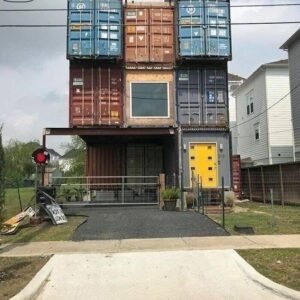At sixteen, my life was consumed by fire—literally. One cold January night, I lost nearly everything: my parents, my grandfather, my home, and the childhood I once knew. The flames that tore through our kitchen left behind more than charred wood and ash; they carved out a hollow in my chest that I carried for years. Somehow, I was the only one spared. Pulled from the house barefoot in pajamas, I stood shivering in the snow while the people I loved most vanished inside. From that moment forward, I was adrift.
With no parents left to care for me, I was placed in a youth housing program—a dorm-style shelter for displaced teens. It was clean and safe, with shared bathrooms and a communal kitchen, but it felt like a holding space between what I had lost and a future I couldn’t yet see. My only living relative, Aunt Denise, made it clear she had no room for me in her home. Still, she managed to claim half of the insurance payout from my parents’ deaths, promising to use it for my needs. Instead, she bought herself new outfits, a car, and a wine fridge. She called it her “grieving wardrobe,” a phrase that still makes my stomach turn.
For a long time, I drifted through my days. At school, I worked as hard as I could, clinging to the hope of scholarships and independence. But when night fell, and the dorm was buzzing with chatter and glowing screens, I found myself in the kitchen. Grief pushed me into baking. With donated pans and a wine bottle for a rolling pin, I made pies—blueberry, apple, peach, rhubarb, whatever I could manage with my meager budget. Baking steadied my shaking hands and gave me something grief could not steal: purpose.
I began delivering the pies anonymously to shelters and hospice centers. I never left my name, never asked for recognition. I just needed to give. I had lost my family, but I still had love, and I needed to pour it into something that mattered. My aunt called it a waste. “Those people don’t even know who you are,” she snapped once over the phone. But I knew better. Grief doesn’t vanish by hoarding—it softens when you share it.
For nearly two years, I kept baking. I never met the people who ate my pies. That distance made it easier. I didn’t want to face their eyes, didn’t want them to see the broken girl who had nothing left. But then, one afternoon, just after my eighteenth birthday, everything changed.
The receptionist at the shelter handed me a plain cardboard box with my name on it. No return address. I opened it and froze. Inside was a pecan pie, perfectly golden, with braided crust and powdered sugar sprinkled delicately across the top. Tucked inside was a folded note:
“To the young woman with the kind heart and golden hands,
Your pies made my final months feel warm and full of love.
I never saw your face, but I felt your soul.
I don’t have family left.
But I’d like to leave my home and my blessings to someone who knows what love tastes like.
—M.”
I nearly collapsed. I didn’t understand what it meant until three days later, when a lawyer named Paul called. His voice was calm, steady, as though he’d rehearsed the conversation many times. “Margaret Hendley passed away last week,” he explained. “She named you as the sole beneficiary of her estate.”
At first, I thought he had the wrong person. Margaret was a retired librarian, widowed, and childless. She had been in hospice care for her final year. She had stage 4 liver cancer and had largely withdrawn from the world—until my pies began arriving. Nurses told Paul that Margaret eagerly waited for each delivery, asking them to describe every crust and filling in detail since she was losing her sight. She kept a journal about the pies, guessing flavors from the smell and writing down her thoughts about the person who made them. “She said,” Paul added, “‘Whoever she is, she’s young, grieving, but still knows how to love.’”
Margaret left me everything—her house, her belongings, and a trust fund of more than five million dollars that her late husband had set aside. My knees buckled under the weight of it all. I laughed and cried at the same time, sitting on a bus bench with my scholarship forms scattered at my feet.
I didn’t tell anyone at first, not even the girls in the shelter. Saying it out loud felt dangerous, as if I might lose it by speaking too soon. But secrets don’t stay hidden. Aunt Denise eventually found out through public probate notices. She called me immediately, her voice sharp: “You owe me. I raised you after the fire. That money should be mine.” But she hadn’t raised me. She hadn’t given me love, shelter, or comfort. Only contempt. I blocked her number that night.
Now I live in Margaret’s house, a warm place filled with the smell of cedar and the presence of someone who understood grief and generosity. In her kitchen, I bake with her rolling pin and spoons, often reading the note she left me. Above her oven hangs a sign that reads, “The best ingredient is time.”
I still bake pies for the hospice and the shelter, but now I leave my name on the boxes. Each note says, “Baked with love, from someone who’s been where you are.” Margaret gave me more than a house or money—she gave me a sense of peace I thought I’d never feel again.
Her pie changed my life, but it was her kindness that truly saved me.





